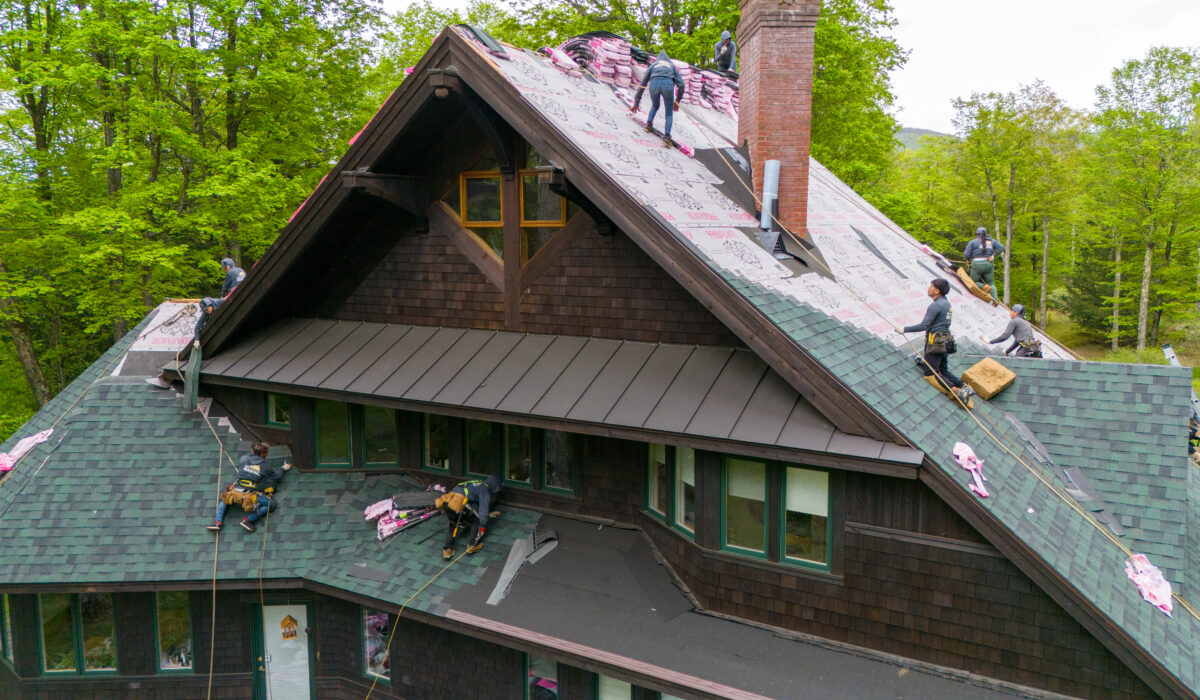A roof replacement is one of the biggest investments a homeowner can make. Whether your roof is approaching the end of its lifespan or storm damage has left it compromised, understanding how to budget for a roof replacement upfront can save you stress and thousands of dollars.
As experienced Vermont roofers, we’ve seen homeowners caught off guard by unexpected costs. This guide breaks down the factors that influence roof replacement costs, how to plan ahead, and how to work with a roofing contractor to keep your project on budget.
Why Roof Replacement Costs Vary
If you’ve ever gotten multiple quotes for a roof replacement, you’ve probably noticed they can vary widely. That’s because roof pricing isn’t one-size-fits-all; it depends on a mix of material choices, labor requirements, and the complexity of your home’s structure.
Common factors include:
- Roof size and pitch: Larger or steeper roofs require more labor and materials.
- Material type: Asphalt shingles are budget-friendly, while premium shingles, metal, or slate significantly increase costs.
- Tear-off vs. overlay: Removing old shingles and underlayment adds time and disposal fees, but ensures a longer-lasting roof.
- Structural repairs: Rotten decking or damaged flashing can add unplanned expenses if not addressed upfront.
- Ventilation upgrades: Proper attic ventilation (sometimes required to meet code) can improve performance but adds cost.
Knowing these factors ahead of time is the first step to avoiding sticker shock.
Understanding Typical Roof Replacement Costs in Vermont
While prices fluctuate depending on materials and labor, Vermont homeowners can expect a roof replacement with asphalt shingles to fall within the $9,000–$18,000 range for an average-sized home. Premium shingles or steep, complex roofs may exceed $20,000.
The good news? Asphalt shingles remain one of the most cost-effective and durable options, especially when installed by an experienced roofing contractor. By planning your budget based on realistic numbers, you can prevent last-minute surprises.
Get Quotes from Trusted Roofing Contractors
One of the best ways to understand your project’s cost is to get detailed written estimates from at least two or three licensed roofing contractors. Make sure each quote includes:
- Material costs (shingles, underlayment, flashing)
- Labor costs
- Waste disposal and cleanup fees
- Permits or inspections (if required)
- Warranty details for materials and workmanship
Comparing itemized quotes helps you spot outliers and understand what’s included. Don’t automatically choose the lowest bid. Quality installation saves money in the long run by reducing repairs and extending your roof’s lifespan.
Plan for Hidden Costs
Even with a detailed estimate, some costs can arise unexpectedly. A trustworthy roofing contractor will explain these possibilities in advance, but it’s wise to budget an additional 10–15% as a contingency for things like:
- Rotten or warped decking discovered during tear-off
- Upgrades to ventilation or insulation to meet code
- Replacing damaged gutters or flashing
- Extended labor time due to weather delays
This buffer ensures your project can proceed smoothly without financial stress.
Choose the Right Roofing Material for Your Budget
Material selection is one of the biggest drivers of your roof replacement cost. For Vermont homeowners, asphalt shingles offer an ideal balance of cost, durability, and aesthetic flexibility. Architectural asphalt shingles can even mimic wood or slate without the extra weight or expense.
When meeting with your roofing contractor, ask about:
- Warranty coverage
- Expected lifespan of each shingle type
- Energy efficiency and potential savings on heating/cooling bills
This ensures your investment aligns with your home’s long-term needs.
Ask About Financing and Payment Options
Many homeowners are surprised to learn that reputable roofing contractors often offer financing options. These can help spread out the cost of a roof replacement and make it easier to plan. Before work begins, clarify:
- Deposit requirements
- Payment schedule
- Interest rates (if financing)
- Accepted payment methods
Clear communication about payment terms upfront is another way to avoid surprises.
Seasonal Timing Matters
Roof replacements can cost more during peak demand (late summer and early fall) when contractors are busiest. Booking during the off-season—such as spring or even winter (if weather permits)—can sometimes secure better pricing or faster scheduling.
Ask your Vermont roofers about their seasonal availability and any discounts for scheduling early.
Protect Your Investment with a Warranty
A good warranty gives you peace of mind and protects your budget long-term. Make sure your roofing contractor offers both:
- Manufacturer warranty for the shingles
- Workmanship warranty for the installation
These can save you thousands if issues arise later. Always keep warranty documentation in a safe place.
Final Thoughts: A Smart Budget for a Roof Replacement
Budgeting for a roof replacement doesn’t have to be stressful. By understanding the factors that drive cost, planning for contingencies, and working with a trusted roofing contractor, you can take control of the process and avoid unpleasant surprises.
For Vermont homeowners, the key is preparation. Start with a clear estimate, set aside a contingency fund, and choose a contractor who prioritizes transparency. With these steps, your new roof can be an investment that protects your home and your wallet for decades to come.


